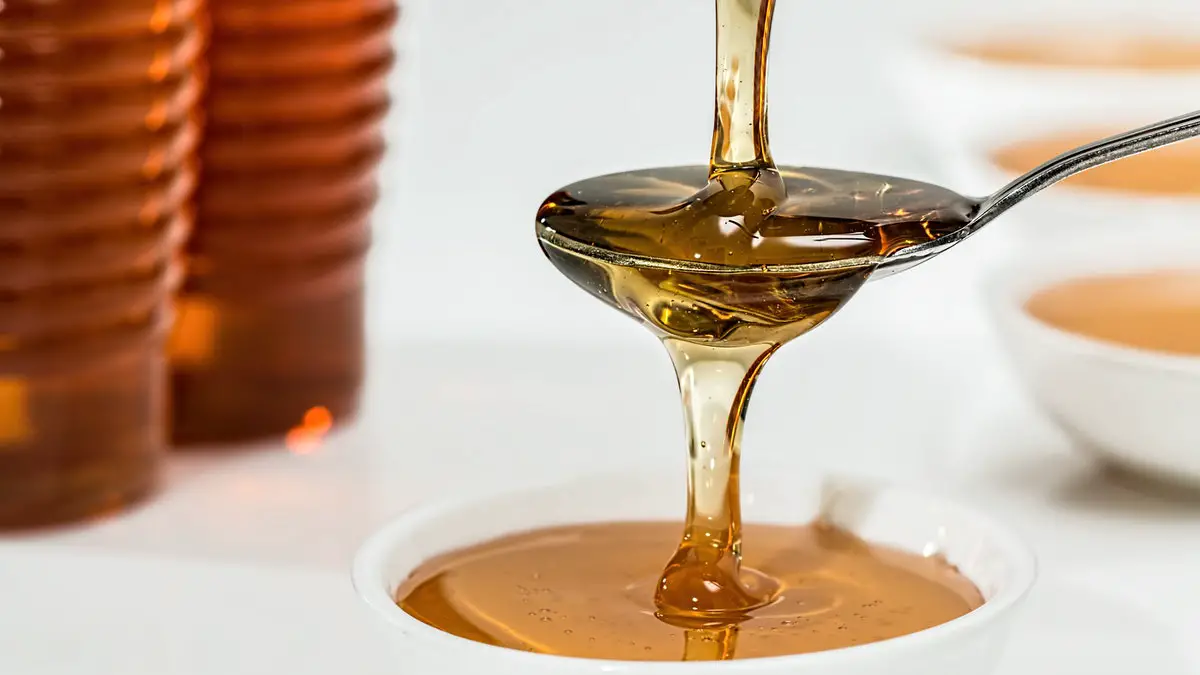
Honey is a sweet, viscous liquid that is produced by honeybees from the nectar of flowers. It has been used for centuries for its medicinal properties.

Here are some of the health benefits of honey:
- Improves gut health: Honey is a prebiotic, which means it feeds the beneficial bacteria in your gut. This can help to improve digestion and overall gut health.
- Boosts immunity: Honey contains antioxidants and other compounds that can help to boost your immune system. This can help to protect you from getting sick.
- Fights infection: Honey has antibacterial and antifungal properties that can help to fight infection. This can be helpful for treating wounds, burns, and other infections.
- Relieves coughs: Honey can help to soothe a cough and make it easier to cough up mucus. This can be helpful for treating a cough caused by a cold or the flu.
- Lowers blood sugar levels: Honey can help to lower blood sugar levels in people with diabetes. This is because honey contains a type of sugar that is slowly absorbed into the bloodstream.
- Improves wound healing: Honey can help to improve wound healing by promoting the growth of new tissue. This can be helpful for treating cuts, scrapes, and burns.
- Moisturizes skin: Honey can help to moisturize skin and protect it from damage. This can be helpful for people with dry skin or eczema.
- Anti-aging properties: Honey contains antioxidants that can help to protect the skin from damage caused by free radicals. This can help to reduce the appearance of wrinkles and other signs of aging.
How to Use Honey for Health :
There are many ways to use honey for health. Here are a few examples:
- To improve gut health: Add 1-2 teaspoons of honey to your daily diet. You can add it to tea, yogurt, or oatmeal.
- To boost immunity: Take 1-2 teaspoons of honey daily, especially during the winter months. You can also add it to hot water with lemon for a soothing and immune-boosting drink.
- To fight infection: Apply honey directly to the affected area. You can also make a honey and water mixture and gargle with it to soothe a sore throat.
- To relieve coughs: Take 1-2 teaspoons of honey before bed. You can also add it to warm milk or tea.
- To lower blood sugar levels: Add 1-2 teaspoons of honey to your daily diet. You can also add it to meals or snacks.
- To improve wound healing: Apply honey directly to the affected area. You can also make a honey and water mixture and use it as a compress.
- To moisturize skin: Apply honey directly to the skin. You can also mix it with other ingredients, such as yogurt or olive oil, to make a mask.
- For anti-aging properties: Apply honey directly to the skin. You can also mix it with other ingredients, such as lemon juice or rose water, to make a toner.
Safety Considerations :
Honey is generally safe for most people to consume. However, there are some safety considerations to keep in mind.
- Honey should not be given to children under the age of 1 year. This is because honey can contain spores of a bacteria called Clostridium botulinum, which can cause botulism in infants.
- Honey can cause allergic reactions in some people. If you are allergic to bees or other insects, you may be allergic to honey.
- Honey can cause diarrhea in some people. If you have a sensitive stomach, you may want to start with a small amount of honey and see how you tolerate it.
Conclusion:
Honey is a natural sweetener that has many health benefits. It can be used to improve gut health, boost immunity, fight infection, relieve coughs, lower blood sugar levels, improve wound healing, moisturize skin, and protect against aging. Honey is generally safe for most people to consume, but there are some safety considerations to keep in mind.




